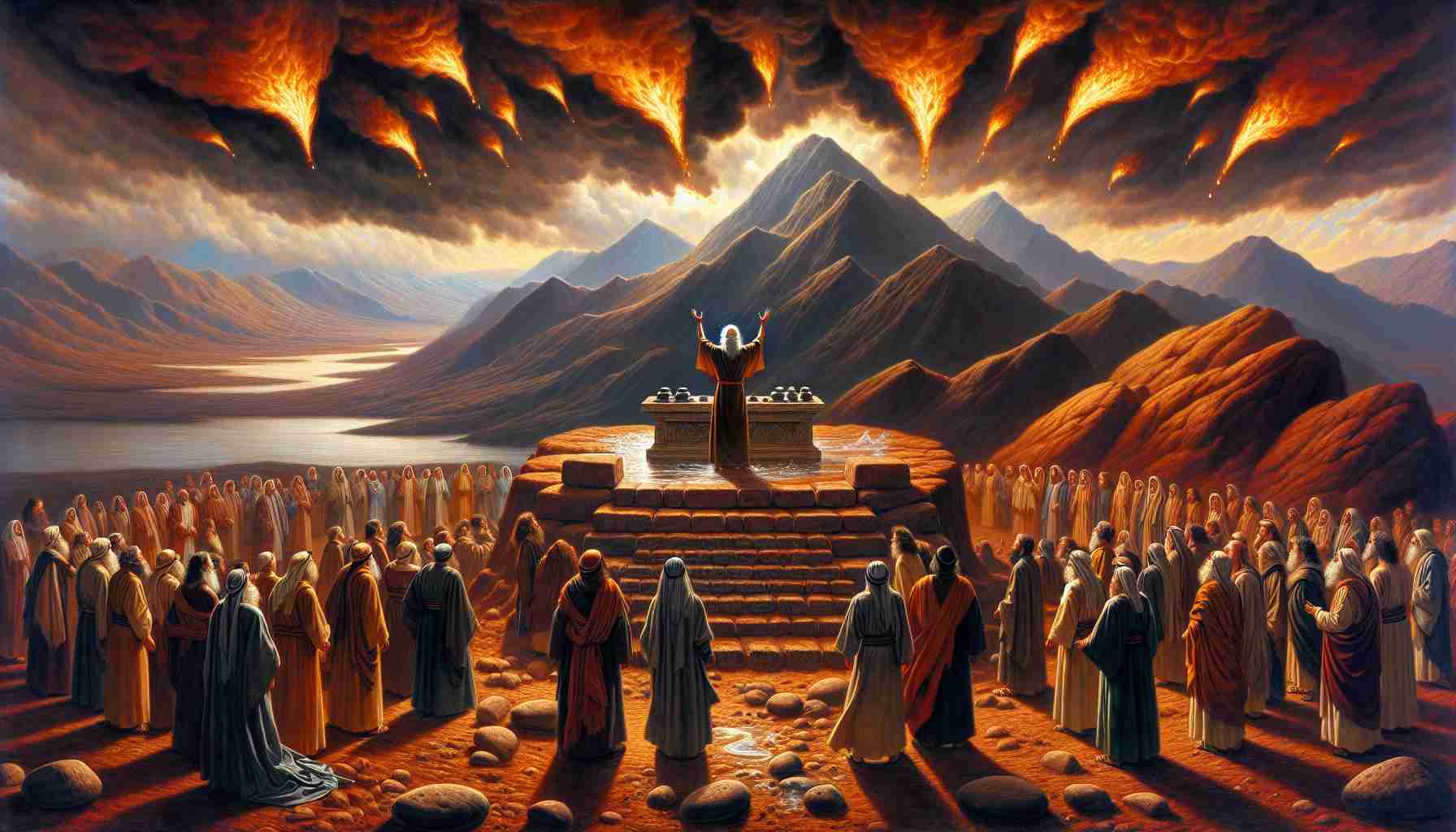

I was a shepherd’s daughter from the hills near Mount Carmel. My days were filled with wildflowers and goats, not fire from the sky. But I remember the day everything changed—not just for me, but for all of Israel.
It hadn’t rained in years. The land was dry and cracked. Our goats grew so thin you could count their ribs. People whispered that it was the prophet Eliyahu—Elijah, some called him—who had prayed for the skies to close. He said Hashem—the name we use to speak of God with reverence—was angry. The people had turned to Baal, the storm god, begging him for rain.
But no rain came.
My father still believed in Hashem. But even he grew quiet when Queen Izevel—Jezebel—sent soldiers to hunt down His prophets. People stopped speaking the old prayers out loud. Some said Eliyahu was gone for good.
Then word spread: Eliyahu had returned. He was calling all Israel to Mount Carmel. There, he would face the prophets of Baal.
“Whoever brings down fire from the sky—that’s the true God,” my father said, repeating the prophet’s challenge.
I begged him to take me. “Please, Abba,” I said. “I want to see.”
He hesitated, then nodded.
The mountain was crowded with people—silent, waiting. The prophets of Baal, four hundred and fifty of them, danced and shouted all morning. They built an altar, laid wood, placed their sacrifice, and called to Baal.
Nothing happened.
They shouted louder. Cut themselves. Spun in circles. I covered my ears. Still—nothing. The sun burned overhead. Still no fire. No answer.
Then Eliyahu stepped forward. One man, standing alone.
He rebuilt an altar with twelve stones—one for each tribe of Israel. Then, strangely, he called for water. Buckets and buckets, poured over the wood, the sacrifice, the stones—until everything was soaked.
“What is he doing?” I whispered.
“No fire could light that now,” my father said.
That was the point.
Eliyahu didn’t shout. He prayed. Quiet and steady.
And then—fire.
It fell from the sky like lightning but brighter. It consumed the wet wood, the stones, the sacrifice, even the water in the trench. Nothing was left but scorched earth and silence.
Then the crowd dropped to their knees.
“Hashem—He is God! Hashem alone!”
I didn’t understand all of it. But I understood this: truth doesn’t need to scream. When it comes, it burns through everything in its way.
That night, the clouds returned. And after years of silence, the skies finally opened.
I was a shepherd’s daughter from the hills near Mount Carmel. My days were filled with wildflowers and goats, not fire from the sky. But I remember the day everything changed—not just for me, but for all of Israel.
It hadn’t rained in years. The land was dry and cracked. Our goats grew so thin you could count their ribs. People whispered that it was the prophet Eliyahu—Elijah, some called him—who had prayed for the skies to close. He said Hashem—the name we use to speak of God with reverence—was angry. The people had turned to Baal, the storm god, begging him for rain.
But no rain came.
My father still believed in Hashem. But even he grew quiet when Queen Izevel—Jezebel—sent soldiers to hunt down His prophets. People stopped speaking the old prayers out loud. Some said Eliyahu was gone for good.
Then word spread: Eliyahu had returned. He was calling all Israel to Mount Carmel. There, he would face the prophets of Baal.
“Whoever brings down fire from the sky—that’s the true God,” my father said, repeating the prophet’s challenge.
I begged him to take me. “Please, Abba,” I said. “I want to see.”
He hesitated, then nodded.
The mountain was crowded with people—silent, waiting. The prophets of Baal, four hundred and fifty of them, danced and shouted all morning. They built an altar, laid wood, placed their sacrifice, and called to Baal.
Nothing happened.
They shouted louder. Cut themselves. Spun in circles. I covered my ears. Still—nothing. The sun burned overhead. Still no fire. No answer.
Then Eliyahu stepped forward. One man, standing alone.
He rebuilt an altar with twelve stones—one for each tribe of Israel. Then, strangely, he called for water. Buckets and buckets, poured over the wood, the sacrifice, the stones—until everything was soaked.
“What is he doing?” I whispered.
“No fire could light that now,” my father said.
That was the point.
Eliyahu didn’t shout. He prayed. Quiet and steady.
And then—fire.
It fell from the sky like lightning but brighter. It consumed the wet wood, the stones, the sacrifice, even the water in the trench. Nothing was left but scorched earth and silence.
Then the crowd dropped to their knees.
“Hashem—He is God! Hashem alone!”
I didn’t understand all of it. But I understood this: truth doesn’t need to scream. When it comes, it burns through everything in its way.
That night, the clouds returned. And after years of silence, the skies finally opened.